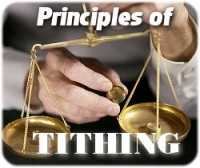
When people teach about the law of the tithe, they usually go to a few passages in the Mosaic Law.
Popular Teaching on Tithing
One of the more popular Scripture passages on tithing is Deuteronomy 14:22. It says this: “You shall truly tithe all the increase of your grain that the field produces year by year.” A similarly popular passage is Leviticus 27:30: “And all the tithe of the land, whether of the seed of the land or of the fruit of the tree, is the Lord’s. It is holy to the Lord.”
These passages are often used to defend the practice of reserving 10% of a person’s income for God. These passages indicate that the tithe belongs to God; it does not belong to us.
And what should be done with the tithe? If it belongs to God, how can a person give it to God? Again, the person who defends the practice of tithing will often turn to another passage in the writings of Moses, Numbers 18:24: “For the tithes of the children of Israel, which they offer up as a heave offering to the Lord, I have given to the Levites as an inheritance.” And since the modern equivalent of a Levitical priest is a pastor, it is often argued that the tithes should go to support the work of the pastor, or at least the ministry of the church. So in the vast majority of churches, about one-half of the tithe goes to pay the pastor’s salary, and the other half goes to pay for the church building and programs.
But is this actually what the Mosaic Law teaches? Not quite.
The Party Tithe
If we look at these passages in context, a different picture emerges about what these tithes are for. For example, although Deuteronomy 14:22 is a popular verse on tithing, the following verses say what this tithe is to be used for. Notice the shocking instructions in Deuteronomy 14:23, 26 about what to do with the tithe:
And you shall eat before the Lord your God, in the place where He chooses to make His name abide, the tithe of your grain and your new wine and your oil, of the firstborn of your herds and your flocks, that you may learn to fear the Lord your God always….
And you shall spend that money for whatever your heart desires: for oxen or sheep, for wine or similar drink, for whatever your heart desires; you shall eat there before the Lord your God, and you shall rejoice, you and your household.
Wait! What? The tithe from the people is for them to spend on themselves? For whatever their heart desires? For food and drink?
Yes. That’s right. The tithe was for a big family feast. The text states that they should bring a tenth of their crops and a tenth from the newborn of their herds, and come together with everybody else, and have a big party.
They will kill the oxen and sheep, and then cook and eat it.
They shall take the grain and oil, and bake bread. And take the grapes and make wine.
And then have a big party! Eat it all! Enjoy life! Feast! Laugh! Sing! Dance! Drink!
Tithing to God and Family
 Why do you think God instituted this sort of tithing? Why would it be so important that families feast and celebrate together? What does this sort of tithe tell us about this world, about food and drink, about celebration, and about family?
Why do you think God instituted this sort of tithing? Why would it be so important that families feast and celebrate together? What does this sort of tithe tell us about this world, about food and drink, about celebration, and about family?
I think it shows us how important celebration is to God. Sometimes we Christians are too somber and serious. Sometimes we sound like we think this world is so far gone, we cannot wait until Jesus Christ returns and incinerates this whole planet. I think these sorts of attitudes among Christians saddens God. He gave this earth to us to enjoy, and we will spend eternity on a world very similar to this one. He created food and drink to celebrate life together. He wants us to laugh and sing and dance.
And at the center of it all is family. This tithe to the family celebration was to help the family live life and bond together in joy and celebration of a life lived with God.
Jesus, of course, is a perfect example of all of this, as His life was characterized by joy and laughter. But all of that is a subject for another time.
Tithing to the Priests
So what about tithing to the Levitical priesthood? Well, the tithe to the family celebration was only supposed to occur for two years. On the third year, they did something else with the tithe. We will look at this tomorrow.




😀 I’m also interested to see what you do with the notion that pastors are the equivalent of the Levitical priesthood…
So we obviously need to start throwing more parties! No clowns though….please….haha
Would we call this “Party hardy with Jesus”, or “Party hearty with Jesus”?
Would love more hearty (and hardy) parties.
This is a good article. I found this tithe in my study during research. See my study.
http://www.holytithe.com/TithingPresent.pdf
Frank,
Wow! That is a very well-done and complete study of tithing and the surrounding issues! Fantastic. Thanks!
Hi Jeremy
Beautiful study of the bible. I cannot find this article on the given link. Could you kindly send me the article.
Thanks,
Hello Frank
Could you kindly send me this article. I can’t find it using this link.
Thank you,
Really liking most of what I’m reading here. I’ve always hated the way so many verses have been isolated and de-contexualized … will be reading more here to be sure.
Regarding this post, the reference states, “…in the place where He chooses to make His name abide…”
Given that all of this is about taking scripture in the proper context, would it be correct to assume that when written this applied to temples? If not, where?
Further, where would this place be in modern context?
Would it be “The” or “a” church?
Or simply, “where two or more gather in His name?”
Great questions, Mike.
Yes, I think that in the original context, the temple is in view.
As to the modern equivalent, it would not be the church building, that is for sure. I think we would need to ask where today “He chooses to make His name abide.” Where is that? In us… WE are the temple of the Holy Spirit. He dwells in us and lives through us. I am not saying we should tithe to ourselves… what I am saying is that each of us has the freedom and flexibility to use our money and time to help love and serve others… especially those whom God has laid on our hearts and minds to help. We should not feel obligated to give to a particular group or ministry just because they ask for our “tithe.”
Thanks for the quick reply! This definitely added an interesting twist to my life/small-group discussion last night on the current series about giving. 🙂
When the question came up (from the group leader), “Why do we always seem to push back on tithing?” I responded that ( at least from my perspective) that for some, it may be about “greed” or personal circumstances … but that there will likely continue to be “push back” on anything that smacks of legalism, regardless of the subject.
Perhaps more important on a personal level, researching this subject does have me reflecting more on giving … not just on how much but also to who or what organizations, in a way that’s far more invigorating than sweating over the numbers. Thanks for being a part of that!
Is your life/small-group part of a larger church gathering? If so, is the pastor currently doing a series on tithing, money, or stewardship? Just curious…
Yes, and yes.
Just getting re-involved in a church after a bit of a bad tasted from the last one some time ago. Mostly focusing on the group aspect for the more direct and fulfilling fellowship it allows, but the discussion does tend to be oriented around the weekly message.
The series seems to be overall re: giving. First week centered around “serve God vs. serve money”, last week re: tithing. The overall direction remains to be seen.
Hm. Well, I would love to know how it ends up. The Bible truly does talk about money a lot, and so it is a good idea for pastors to preach and teach on it. But in my experience, these stewardship sermon series often result in “So give lots of money because we are going to add a youth wing onto the church.” Again, that might not be bad… but I just sometimes wonder if there might be better ways to spend that $10 million.